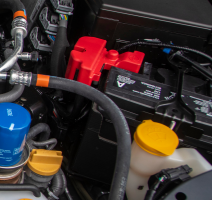— A Subaru battery drain lawsuit alleges 2016-2020 Subaru Outback and 2019-2020 Subaru Ascent vehicles are equipped with batteries that don't have enough capacity to power the electrical systems when the vehicles are turned off.
Multiple lawsuits were filed concerning the alleged Subaru battery drain problems, including Dalen v. Subaru and Tomasian v. Subaru.
Those battery lawsuits were consolidated into a class action titled, In re Subaru Battery Drain Products Liability Litigation.
The plaintiffs say Subaru owners must jump-start their drained batteries and continue to charge the batteries to keep the vehicles going. The lawsuit also alleges Subaru drivers can become stranded, forced to find alternative transportation, purchase battery jumper cables and pay for battery chargers.
The class action alleges even when Subaru replaces the batteries under warranties, the replacement batteries also suffer from the same battery drain problems.
The plaintiffs complain Subaru should have told them about the alleged battery drain problems before the vehicles were sold. Those plaintiffs claim Subaru knew in 2017 about the alleged defects but concealed the information from consumers.
Subaru Files Motion to Dismiss the Battery Drain Lawsuit
In its motion to dismiss the class action, Subaru told the judge that governing law requires the dismissal of the claims for lack of subject matter jurisdiction, or for failure to state a claim.
Subaru also reminded the judge four plaintiffs have voluntarily dismissed their claims since the filing of the consolidated lawsuit, including plaintiffs Tomasian and Dalen from the cases mentioned above.
According to lawyers for Subaru, the battery drain lawsuit "is a classic vague and inconsistent 'shotgun' pleading that 'assert[s] multiple claims against multiple defendants without specifying which of defendants are responsible for which acts or omissions, or which of the defendants the claim is brought against.'”
The judge was told the plaintiffs lack standing over claims for Subaru models the plaintiffs never owned or lease, but can only pursue claims related to the Subaru vehicles they own.
Subaru argues the plaintiffs cannot represent owners of other vehicles equipped with different batteries, components and software files which are alleged to be at the heart of the defect allegations.
Additionally, Subaru alleges the plaintiffs do not have standing to assert claims based on the marketing of products they did not purchase.
The automaker also argues claims brought under New Jersey law by non-New Jersey plaintiffs must be dismissed, and the judge should also allegedly dismiss the Magnuson-Moss Warranty Act claims based on jurisdictional requirements.
According to Subaru, the law is clear:
“No claim shall be cognizable in a suit brought [in federal court] … if the action is brought as a class action, and the number of named plaintiffs is less than one hundred.”
The judge was also told in the motion to dismiss that the battery drain lawsuit alleges a breach of warranty based solely on alleged design defects, but design defects are not covered under the new vehicle limited warranty.
Subaru further told the judge multiple additional allegations must be dismissed based on governing law, including implied warranty claims which are allegedly time-barred and claims by certain plaintiffs because they didn't give Subaru the opportunity to repair the problems.
Subaru points to express warranty claims made by nine plaintiffs. The automaker argues the battery drain class action doesn't allege those plaintiffs presented their vehicles for repairs, a necessary condition under the warranties.
Subaru also argues certain plaintiffs have no warranty claims because they didn't provide Subaru with pre-lawsuit notice.
And finally, Subaru alleges in its motion that the plaintiffs haven't adequately pleaded their fraud claims.
"Although the Consolidated Complaint refers to alleged advertisements about general vehicle safety, TSBs, and Internet postings, not a single Plaintiff identifies what specific misrepresentations, or statements omitting material facts, if any, he or she read, heard, saw, or reviewed, and when or where those statements were made."
The Subaru battery drain class action lawsuit is being debated in the U.S. District Court for the District of New Jersey. The case is titled, In re Subaru Battery Drain Products Liability Litigation.

